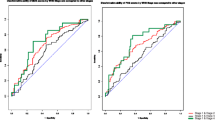Abstract
Objectives: Translation and psychometric evaluation of a Thai version of the Medical Outcomes Study HIV Health Survey (MOS-HIV) in Thailand. Methods: A cross-sectional survey in Chiang Mai province, northern Thailand, with data collected in face-to-face interviews using a structured questionnaire designed to measure 10 scales of quality of life (QOL). We recruited 200 people with HIV/AIDS attending self-help groups in the municipal area. Standard guidelines were followed for questionnaire translation and psychometric evaluations. Results: Item-level internal consistency and discriminant validity were reasonably established. Success rates were 93.8 and 97.4%, respectively. Scale-level internal consistency reliability of multi-item scales was satisfactory, ranging from 0.74 to 0.88, with all exceeding inter-scale correlations. Principal components analysis of item and scale scores identified two hypothesized dimensions of the MOS-HIV. The mental health component was strongly loaded by health distress, mental health, vitality and cognitive function scales, and physical health by role, physical and social functions, and pain scales. Respondents manifesting symptoms or reporting worsening health status scored significantly lower on all scales. Conclusions: These preliminary studies have shown the Thai version of the MOS-HIV to have psychometric properties comparable with those reported in previous surveys. Further testing and modification should make it useful as an HIV-specific QOL measure in Thailand.
Similar content being viewed by others
References
Nelson KE, Celentano DD, Eiumtrakol S, et al. Changes in sexual behavior and a decline in HIV infection among young men in Thailand. N Engl J Med 1996; 335: 297-303.
Rojanapithayakorn W, Hanenberg R. The 100% condom program in Thailand. AIDS 1996; 10: 1-7.
Phongphit S. State of the art review on socio-economic and behavioral research on AIDS. Satellite symposium on community based care for PWHA: Lessons learned from Thailand and future perspectives. 19–20 April 1999, Bangkok, 1999.
Natpratan P. Experience in the formation of groups of people living with HIV in the upper north of Thailand. Chiang Mai: Office of Communicable Disease Control Region 10, 1998.
AIDS Access Foundation (ACCESS). My Positive Life. Bangkok: ACCESS, 1999.
Natpratan C, Burapangura C, Kunawararak P, Sennun R. Community based HIV/AIDS prevention and care in Northern Thailand. Int Conf AIDS 1996; 11: 189.
Chandrtat na ayuthya P, Teokul W, Suebsaeng WT. Assessment of the Thailand Government community support programme in the six northern provinces. Int Conf AIDS 1998; 12: 1029.
Suprasert S. Sanpatong home-based care project, Thailand. Comfort and hope: Six case studies on mobilizing family and community care for and by people with HIV/AIDS (UNAIDS Best Practice Collection). Geneva: Joint United Nations Programme on HIV/AIDS, 1999.
Knodel J, Van Landingham M, Saengtienchai C, Im-em Wassana. Older people and AIDS: Quantitative evidence of the impact in Thailand. Soc Sci Med 2001; 52: 1313-1327.
Streiner DL, Norman GR. Health Measurement Scales: A Practical Guide to their Development and Use. 2nd edn. Oxford: Oxford University Press, 1995.
McDowell I, Newell C. Measuring Health: A Guide to Rating Scales and Questionnaires. 2nd edn. New York: Oxford University Press, 1996.
Wu AW. Quality of life assessment comes of age in the era of highly active antiretroviral therapy. AIDS 2000; 14: 1449-1451.
Wu AW, Revicki DA, Jacobson D, Malitz FE. Evidence for reliability, validity and usefulness of the Medical Outcome Study HIV Health Survey (MOS-HIV). Qual Life Res 1997; 6: 481-493.
Wu AW, Rubin HR, Mathews WC, et al. A health status questionnaire using 30 items form from the Medical Outcome Study: Preliminary validation in persons with early HIV infection. Med Care 1991; 29: 786-798.
Ware JE. MOS-HIV Health Survey Scoring Guidelines. Mass: Medical Outcomes Trust, 1997.
Bullinger M, Alonso J, Apolone G, et al. Translating health status questionnaires and evaluating their quality: The IQOLA Project approach. J Clin Epidemiol 1998; 51: 913-923.
Ware JE, Gandek B for the IQOLA Project Group. Methods for testing data quality, scaling assumptions, and reliability: The IQOLA Project approach. J Clin Epidemiol 1998; 51: 945-952.
Revicki DA, Sorensen S, Wu AW. Reliability and validity of physical and mental health summary scores from the Medical Outcomes Study HIV Health Survey. Med Care 1998; 36: 126-137.
Scott-Lennox JA, Wu AW, Boyer JG, Ware JE. Reliability and validity of French, German, Italian, Dutch, and UK English translations of the Medical Outcomes Study HIV Health Survey. Med Care 1999; 37: 908-925.
Wu AW, Jacobson DL, Berzon RA, et al. The effect of mode of administration on Medical Outcomes Study health ratings and EuroQol scores in AIDS. Qual Life Res 1997; 6: 3-10.
Ware JE, Kosinski M, Gandek B, et al. The factor structure of the SF-36 Health Survey in 10 countries: Results from the IQOLA Project. J Clin Epidemiol 1998; 51: 1159-1165.
Ren XS, Amick B, Zhou L, Gandek B. Translation and psychometric evaluation of a Chinese version of the SF-36 Health Survey in the United States. J Clin Epidemiol 1998; 51: 1129-1138.
Ware JE, Gandek B, Kosinski M, et al. The equivalence of SF-36 summary health scores estimated using standard and country-specific algorithms in 10 countries: Results from the IQOLA Project. J Clin Epidemiol 1998; 51: 1167-1170.
Author information
Authors and Affiliations
Rights and permissions
About this article
Cite this article
Ichikawa, M., Natpratan, C. Quality of life among people living with HIV/AIDS in northern Thailand: MOS-HIV Health Survey. Qual Life Res 13, 601–610 (2004). https://doi.org/10.1023/B:QURE.0000021319.73865.5a
Issue Date:
DOI: https://doi.org/10.1023/B:QURE.0000021319.73865.5a




